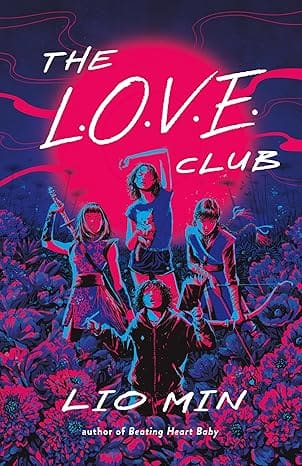
Synopsis:
From the acclaimed author of Beating Heart Baby, an immersive novel following three estranged high schoolers who are pulled into a video game to pursue the disappearance of their friend
Three years ago, Elle (the “E” in the self-proclaimed L.O.V.E. Club) disappeared from Calendula, an affluent Chinese American suburb in inland California. Soon afterward, Liberty and Vera (“L” and “V”) moved away, leaving O alone with her grief, abandonment, and confusion. . . until Liberty and Vera return for their senior year of high school.
Though the L.O.V.E. Club’s three remaining members once bonded as outcasts and gamers, they can’t pick up the pieces of their friendship. But the girls are drawn back to their old clubhouse, where they discover, loaded for them to play, a new game created by none other than the missing Elle.
One click, and Liberty, Vera, and O are ported into Morning Glory, an ever-evolving botanical fantasy coded with their lived experiences, complicated history, and repressed insecurities. Unbeknownst to the others, O can’t remember the events surrounding Elle’s disappearance―but within the game, Elle has sent O a cryptic hint about Morning Glory’s real nature.
While Liberty and Vera defeat increasingly sinister bosses, O grapples with the secret knowledge that her deepest wish, to reunite with Elle, might just come true. But as the girls progress through Morning Glory, O begins to wonder how well she actually knew any of her former best friends and if she’s ready to confront the hard truths―and dangerous revelations―about Elle in her returning memories.
Review:
Sometimes you read a book and you kinda know it’s good, but at the same time, you know that you are definitely not the target audience for it. Sometimes it’s easy to get past, but with The L.O.V.E. Club by Lio Min, I waffled back and forth quite a bit. I liked it, but since I don’t fall into a number of boxes, I had a hard time relating to the characters in many ways. Ultimately, I appreciated Min’s novel and know there are plenty of readers who will fall in love with this effort.
When I first read the synopsis, I thought maybe it was a bit of an homage to Tron. The early 80’s Disney film is at the same time very dated and holds up well in a strange way — so much so that they are releasing a third Tron movie later this year, 43 years after the first one was released. And there are hints of that, but the video game aspect of this story — the part I figured I’d relate to — are actually very minor in many ways. The game exists, but the mechanics are poorly explained, if at all, and it basically comes across as a fever-dream of a fantasy world with no real rules. If you can get past that, the real story has a lot of meat and depth to it.
The bulk of the story is the relationships between four girls and their families. Liberty, Vera, and O meet up, three years after the disappearance of the fourth member of the L.O.V.E. Club – Elle. Elle wrote a computer game that they get sucked into and they are forced to find the exit while dredging up the ghosts of their past. Each of them are Chinese-American daughters and their culture has a huge impact on the story. A big part of the mystery stems from the fact that O is an unreliable narrator and can’t remember the events of three years ago when O disappeared from their lives.
So ultimately, the game mechanics matter little as the important aspects are discovering the truth behind their own lives, relationships, and parents.
It is a bit clunky getting there, but in the end, I found The L.O.V.E. Club to be a healing story for the three remaining members of the friend group. They discover not only who they really are, but what they mean to each other in the end. There are some very moving passages that Lio Min pens in the process and there is some real heartbreak and tragedy along the way. But, you can’t have an omelette without breaking any eggs and Elle’s videogame broke the eggs necessary to repair their relationships.
Like I said, I don’t fit into a number of boxes for this book. As a middle-aged white man from the Midwest, it was hard at times to relate to teenage Chinese-American girls or the transfer of their native culture from China to America and the lasting effect that has on themselves or their families. But ultimately, Lio Min wrote a compelling story that made it easy to get past the parts I couldn’t relate to with stories that all of us can empathize with.
Thank you to Flatiron for providing this book for review consideration. All opinions are my own.










Leave a Reply